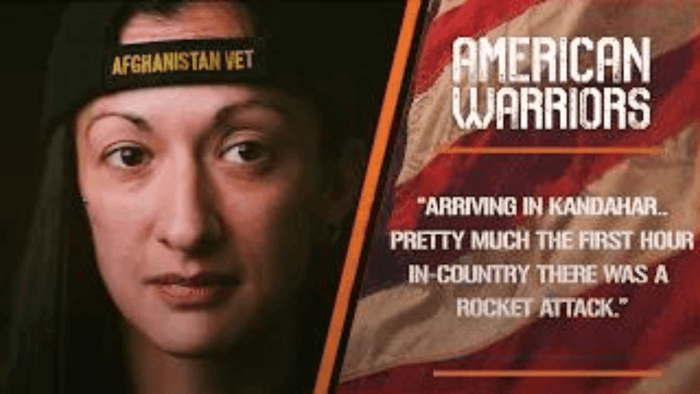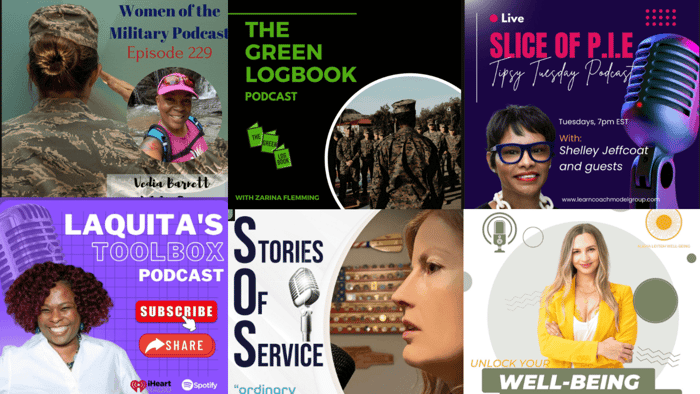An American Warriors Production - Amanda Allen | Hunting Escaped Taliban Prisoners
Introduction
Michigan-born Amanda Allen is a self-described adrenaline junkie. The fire department wasn't enough so she joined the Army. Even though she wanted to be in the infantry and join the Rangers, as a female, she wasn't allowed so the next closest option was Military Police. When she deployed to the middle east, she found that while being a female in the military is already hard, being a female in the military in Afghanistan is even harder. Fortunately her natural grit and fighting spirit served her well.
Lesson Plan
This document is a transcript of an interview with Amanda Allen, a former military police officer who served in Afghanistan. The interview covers her experiences in the military, her time in Afghanistan, and her role in tracking down escaped Taliban prisoners.
Objective
To learn about Amanda Allen's experience in the military, particularly her time in Afghanistan and her role in searching for escaped Taliban prisoners.
Group Discussion Questions
- What inspired Amanda Allen to join the military?
- Why did Amanda Allen want to go to Afghanistan?
- What was Amanda Allen's mission in Afghanistan?
- How did being a female in the military affect Amanda Allen's experience in Afghanistan?
- What challenges did Amanda Allen face upon returning home?
- How does art therapy help Amanda Allen?
Feature Video

https://www.youtube.com/watch?v=hDV0yG9LieA
Transcripts
(00:28)
I was never really the easiest kid, I guess, to deal with. I was kind of an adrenaline junkie. When I was young, I spent most of my time outside, running around, building forts, getting dirty, plenty of bruises.
(00:47)
I've been known to throw a few punches. I was a fighter mostly for fun, just play wrestling. But I liked to win a lot. It was no surprise to anybody that I decided to become a firefighter. And then also not a surprise that being a firefighter wasn't enough adrenaline.
(01:12)
So I decided to join the military. I was 22 and a single mom when I joined the army. It was a surprise to me that I actually made it, but I made it. I had my son before I even joined the fire department, or I think he was about a year old, approximately, when I joined the fire department.
(01:35)
And I was a firefighter for a few years until I decided that I needed more adventure, I needed more substance in my life. I kind of felt like where I was at wasn't going anywhere. And the final push was to see the world.
(01:57)
Basically, I didn't really see the world because it was the National Guard, but I saw Afghanistan, that's for sure. I always wanted to be in the military. I wanted to go in to be infantry and Ranger and all the really hardcore, really awesome things.
(02:16)
That was my plan. But the recruiter kind of snuffed that, and he says, no, you're a female. You can't do that. And I said, well, why can't I? Well, that's just the standard. And he says, well, this is the closest you can get to infantry.
(02:34)
Being a female would be military police, so let's get you started with that. At least I knew that I had to work a little bit harder to prove myself to kind of earn my place, I guess. I was actually one of 20 that was selected to be in the accelerated military police program that they had at the time.
(02:58)
In order to get selected for that program, you have to have really good PT scores. You shoot really well. These people are shooting expert on the range, and they never shot a gun in their life. It was really cool to watch you get selected, basically, by the drill sergeants.
(03:14)
We were accelerated. We were supposed to graduate, I think it was like a month earlier. Halfway through it, they did away with it. We ended up getting sent back to the company with our Berets that we had earned before everybody else and all that.
(03:34)
But the most fun about training to be and MP was, for me, combative and the OC chamber in getting taste. Out combatants was a lot of fun, especially when we got to hit each other with those big QTIP looking things.
(03:54)
The Pugle. The Pugle fight. We got to, like, pick out whoever we were beefing with at the time. Didn't matter who it was. Big dude, tiny dude, huge chick, losers. It didn't matter. Whoever you were beefing with, you're taken out there into the ring.
(04:11)
It my nickname in basic training was Ms. B, and I'm sure you can imagine what the B stands for. Yeah, it wasn't my last name, that's for sure. I got to take out a couple pretty large dudes with huge Qtips, and that was a blast.
(04:36)
Anybody in the service, you have to qualify on your weapons periodically throughout the year. While military police, we also get to qualify on tasers and spray. You need to know what you're putting the other person through, and it's pretty miserable.
(04:58)
I mean, you get a little bit of bragging rights, right? Make it through it and don't pee yourself. I didn't like, I didn't die, but, you know, it was it was a ride. Yes. Mark. At least once a year, you get to do that.
(05:26)
I'm my first weekend at my very first company, I had the experience of bringing my first sergeant an exhaust sample. I'm not a mechanic. I was an MP. The mechanics hated us, probably because we did these sorts of things.
(05:46)
But part of the whole process, you start your day off, you got a PMCs vehicles. You got to go out to the motor pool with your checkboard and go over the truck, check the blinker fluid and, you know, make sure that there's no leaks under the vehicle and make sure that it's all loaded correctly and all that stuff.
(06:12)
And so my task, my very first day, was to help out with PMCs and these Humvees out in motor pool. And part of that, evidently, was providing an exhaust sample to our first sergeant, which, first of all, I was like, man, I don't know why I would have to take this to the first sergeant and not the motor sergeant, but, okay, I'm here for you all first day.
(06:44)
I don't know anything. And so I got me the best exhaust sample that I could possibly get. This thing was huge. Good trash bag full of exhaust to take into the first sergeant's office. I didn't answer the sample emissions.
(07:10)
I hate y'all. Yeah, I fell for that one. And I also fell for looking for boxes of grid squares, as well. I was looking for a box of grid squares for a good while, at least a day. Somebody luckily filled me in on most, if not all.
(07:37)
Of the hazing techniques, but I had a good sense of humor about it, and so I went back, and I was laughing about it, and they're like, wow, okay, all right, cool. Well, she's cool, then you're welcome to hang out in the motor pool as much as you want.
(07:57)
I made a lot of friends. I had a couple of people actually tell me that I'm somebody that made the military more fun than it should have ever been. So that's cool. My first duty station was in awaso, or well, corona, at the 144th military police company in michigan.
(08:22)
And that's where the adventure began in 2009, I think, is when we started hearing about our battalion was going to start doing the rotations to afghanistan, and I wanted to go. I volunteered to deploy with the company that was going the soonest, which ended up being the 1770 fifth MP company out of pontiac, michigan, and I ended up deploying with them.
(08:59)
We arrived in kandahar, afghanistan. It was dark and dusty, and it smelt, horrendous get in processed and things like that, and everybody's just kind of just quiet and wondering if what's going to happen next.
(09:20)
As soon as we left that building, pretty much the first hour in the country. There's a rocket attack, rocket attack, rocket attack. I was like, Where is it? I was the idiot out there like, where's where's this thing at?
(09:43)
Getting then getting yelled at like, you're supposed to be on the ground and in a bunker, not looking in the sky for a stupid rocket with the hell's wrong with you? So I was that idiot at first when I learned you need to get in a bunker.
(10:00)
So our mission in Afghanistan was basically to train the Afghan police how to police their communities. And we did the best that we could. They were very hard to work with. They were lazy. Anytime we went out in the sector, we would have to take them with us.
(10:21)
We weren't really allowed to go on missions without them, because that's our mission, is to train them. It was a bit stressful because you're training these people that may or may not absolutely hate you and everything that you're about and wish you dead.
(10:42)
You're training them on ways to turn around and kill you. And it was pretty nerve wracking and it was futile at the end. We did the best that we could. So for me, being a female in the military, it was hard to begin with, but even harder in Afghanistan, considering the way their culture works with females.
(11:11)
I don't think we're used to seeing females uncovered. So they could see my face, they could see the shape of my body, and. Really creepy feeling because they have no self control. They would stare, they would whisper at each other, they would point, and they would be just blatantly obvious about how they were disrespecting you.
(11:39)
So you kind of have to earn your place with them to work with them. They had a tendency of getting very close physically, like, physically close to you. And I had a drop leg holster on my side, which also had my knife on it, which well, I mean, another nickname for me was Samurai.
(12:03)
I had lots of knives, so if anybody got close to me, I get a little weary, right? Like, why are you so close to me? Well, this Afghan decided he was going to get a little too close one day, and I don't know if he was trying to grab at my knife or grab it my gun, but to me, it doesn't matter.
(12:25)
And he hit the ground. He hit the ground. I took him down. He learned that day in front of his buddies that I'm not to be messed with, and we didn't see him anymore. But after that, they'd be asking for me.
(12:45)
They'd be asking if I was in the convoy, and usually I'd be up behind the gun in the turret, and I'd have to have somebody replace me in the turret, and we'd go and sit down and have chai, which was pretty cool to be able to work on that level with them.
(13:07)
And it became useful because I was also on the female engagement team whenever we had to go out in sector and do, I don't know, maybe traffic control points or something, and search vehicles. There had to be a female engagement.
(13:21)
Team to search the females and deal. With the children and stuff like that. Because the males cannot talk to females. We did a whole lot of other. Things other than just training the Afghans. How to be police officers.
(13:36)
We also had to go pick up EOD and take them wherever they needed to go and sit on IEDs every once in a while or UXOs. And we would also be tasked to. Find high value targets that they were looking for or bolos be on the lookout.
(14:02)
There was a major situation, I think, halfway through my deployment. Seraposa Prison. There was a breakout, a big breakout of prisoners at Seraposa Prison. And we had to go and look for them. It was quite the situation.
(14:21)
It was messy without anyone noticing. For five months, taliban supporters were digging. They began south of the prison under the COVID of a nearby house, burrowing beneath fields, then under a major highway, continuing below a few checkpoints until they broke through a quarter of a mile later, right into a prison cell block.
(14:48)
We had to set up traffic control points, so TCPs so we were searching vehicles that were coming through for anybody that met the description of these people that broke out. They were logged in biometrics with a hide system.
(15:03)
It looks like a camera. It does iris scan and fingerprints. So whenever somebody goes and gets balled up and put in the prison or whatever, they get. They're iris scanned, they get their fingerprints and they get a threat level.
(15:17)
So if we come across anybody in our traffic control point that matches description, we can have them do his fingerprints or have them do his iris scan. All people. We would do the biometrics and if they pop hot on the threat level, then we would transport them.
(15:40)
We got some sort of intel saying that there was like, moles in the Afghan National Army. Somebody high level was going to be assassinated. So I was part of a team, a small team that had to go and do the biometrics on, I think it was over 400 people I was able to identify using the biometrics.
(16:13)
A few of them that led into quite a few more that were detained. And processed, I guess we'll say. I was awarded a coin for that, for doing my job, basically. But it was cool. We got a few people. The picture is right after I got home.
(16:49)
That's the day that I got home, actually, is when that picture was taken. These are right before I left. Phone calls with my son while I was overseas was pretty few and far between. I avoided talking to my family.
(17:11)
As much as possible. I don't know if it was the healthiest thing to do at the time, but it was the only way that I could get through what I was going through over there, especially in RnR. I did not see my son.
(17:26)
I didn't tell my mom, I didn't tell anybody that I was home, because I didn't want to have to deal with that. Him thinking that I'm home and having to say goodbye again. I thought that it would be damaging to him and me.
(17:42)
So I avoided I avoided everyone. I tried my hardest just to focus on the mission and my people there rather than what was going on at home, because it hurt pretty bad. The the end, it was sort of a relief, but mostly I was dreading it.
(18:07)
I wanted to stay, and a lot of us did, surprisingly. And we were kind of also looking for, like, contracting jobs. I was actually offered a fire marshal position at Candahar airfield before I left, and it was something that I considered for just a short time, because then I heard my talk to my son and I got the you're my mommy, right?
(18:39)
And there's no way that I was going to turn around and go back to that place with my son like that. It was an interesting process coming home. It was real interesting process coming from. Nobody prepares you for that.
(18:59)
I missed probably three years of my son's life. How much did he understand about what you were doing? The. Well, he he's such a good boy. I was a firefighter first, right? So he kind of got used to the whole mommy's gotta go, like, right now.
(19:20)
So he he was just little tiny guy, and he hear my tones drop on my pager to respond to the fire department. He'd go run and grab my boots and say, mommy gotta go save the world. You know. He would sometimes I would have to take him up to the fire station and one of the wives would come up there and hang out with them.
(19:42)
So he he kind of I think he got a good taste of that kind of world. With my time in the fire department, but not me being away for really long periods of time. After I got out of the military, I was making some really unhealthy lifestyle choices.
(20:09)
I turned to a lot of drinking, just not taking care of myself at all. And I decided that there was nothing left for me in Michigan anymore. I looked myself in the mirror one day, I said, Damn, girl, you fat.
(20:29)
And I grabbed my son and I said, we're moving to Texas. In 2015, we moved to San Antonio from Michigan, and I started a it's called the track program with the Wounded Warrior Project. They don't have it anymore.
(20:49)
I was part of the last cohort to go through it. They basically help you with transitioning out of the military into the civilian world. It's a year long program, and they accepted me in it, and. I got out here, dropped a whole bunch of weight.
(21:05)
They helped me get through that. It was a complete life changer. Nowadays, I I'm unemployable. The VA's got me unemployable. I've got some major stomach issues from whatever we got into over there that I have to get surgeries for every just six to ten years or so, at least.
(21:31)
Every year, I have to go in and get procedures for the doctors to check and make sure that everything's okay. I mean, I have had to change my entire lifestyle basically now to accommodate the health issues that I have acquired from my service, physically and emotionally.
(21:57)
But luckily, it's not anything that I can't now figure out how to navigate. There's a lot of stuff that has carried on that hasn't been dealt with that I'm now able to take care of. And I found art therapy is the best way to do that for me.
(22:22)
So I spend a lot of my time doing art of many different kinds, mostly making jewelry. But what has helped me the most with it is that I can just focus on this one thing and not have to worry about everything else.
(22:43)
I can just, like, drift away and, like, just have my complete focus and whatever art project or. Jewelry piece or whatever it is that I'm making, I just dive right into it. And afterwards, I can look at this final product, this final piece, and it's representing something.
(23:07)
It's representing me. It's not just pretty. There's everything behind it. And not everybody appreciates that. Not everybody will ever see it. But to me, it's the process of putting these two gemstones together or putting the colors on paper.
(23:32)
Since I've started doing art therapy, I've found more people that are doing it as well, but not necessarily qualifying it as therapy. And so as we get to talking about it, I'm able to help them see it differently, and I think that's really cool.
(23:55)
I've wasted too much of my life on things that are unhealthy and ineffective. And so for the rest of my life, I intend on making it the best that I possibly can for myself and, of course, my husband and my kids.
(24:20)
But before I met my husband, I was convinced I was going to be the crazy cat lady living in the woods. Now I bought a house. Pretty cool house. I bought my own dream truck. I'm an artist. My son is 17 years old, and he's doing all right.
(24:48)
He's 17 going on 25. So he's kind of doing his own thing. He's a good boy. Smart, responsible. It is the best I could do with that one, and I'm pretty impressed by him. I've reinvented and restarted my life plenty of times, and I'm done doing that.
(25:12)
It's time to just be able to relax and enjoy and be appreciative of the things that I have now. You close.





